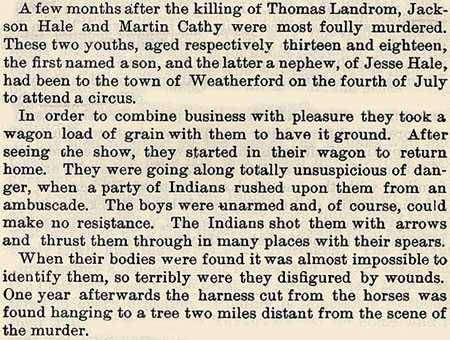Johnnie Hale, a son of Jeff Hale, and Martin Cathey, his uncle, started to Weatherford for a two-fold purpose, and left home about the third or fourth of July 1868. The boys lived at the time, in and near Palo Pinto. Jackson Hale was about twelve or thirteen years of age, and Martin Cathey, his uncle, seventeen or eighteen. Jack jokingly told J.C. Eubanks that he was going to sleep, while Martin Cathey, his uncle drove, so young Hale would be fresh for the ministral show, to be staged in Weatherford that night. The boys not only intended to go to the show, but were in a wagon on their way to mill. Others were going from Palo Pinto to Weatherford, and were only a short distance behind. About noon, while the boys were traveling along north of the old Newberry Place, and about three miles northeast of the present town of Millsap, several Indians came up and killed Martin Cathey and his nephew, Johnnie Hale. The wagon was covered with a sheet, for the weather was extremely warm. And since Johnnie Hale had said he was going to sleep, some have surmised the Indians slipped up and shot Johnnie from the rear end of the wagon before they hardly realized the Indians were around. Johnnie Hale was scalped, and Martin Cathey, who was driving, apparently was left uninjured. Since others were traveling along the road, it has been supposed their presence frightened the Indians and caused them to leave before Martin Cathey was scalped. Just exactly what happened of course, no one knows, for no eye witnesses were present at the time. But at least one person still lives at Palo Pinto who lived there then, and who has heard and thinks that Martin Cathey, who was not scalped, and who was not mortally wounded, was actually frightened to death when the Indians appeared. These things, of course, are more or less suppositions. Nevertheless, two horsemen came along and found the boys a few moments after they had been murdered. Their team had been hurriedly cut from the wagon, and the harness found about one year later, hanging in the brush a short distance away. At the time, Judge Wm. Veale, and his son, Milton, both of Palo Pinto, were on their way to Weatherford, and were traveling in a buggy. They had stopped near the old Fuller-Millsap Place, on Rock Creek, to eat their lunch; and had been here only a short time, when the two horsemen, who found the boys, came dashing up and related the news. Wm. Veale and his son, as well as the two horsemen, hurried over there, for they felt sure it were Johnnie Hale and Martin Cathey that had been killed. These boys were ex-students of Judge Wm. Veale, who had been their teacher only a short time before. Their bodies were carried back to the Brazos, where Jessie Hale, father of Johnnie Hale, lived. They were then carried to Palo Pinto, and until ready for burial, placed in the old Dr. S.S. Taylor's house, now owned by Mrs. Ed Marshall, Sr., Johnnie Hale and Martin Cathey were buried in the lower graveyard. Note: Author personally interviewed Milton Veale, and J.C. Eubanks, mentioned above. Also interviewed Judge E.K. Taylor, who a short time before was also a teacher of Johnnie Hale; Mrs. Jane Bevers, Mrs. Jerry Hart, Mrs. H.G. Taylor, Jodie Corbin, Mrs. Matilda (D'Rossette) Van Cleve, Mrs. Julia (D'Rossette) Scott, J.C. Jowell, Mrs. Wm. Metcalf, James and Sam Newberry, and other settlers who lived in Palo Pinto and Parker Counties at the time. The above story is from the book, The West Texas Frontier, by Joseph Carroll McConnell. The following is from the book, A Cry Unheard, by Doyle Marshall:
The following story is from the book, Indian Depredations in Texas, by J.W. Wilbarger.
|
||||
|
||||
